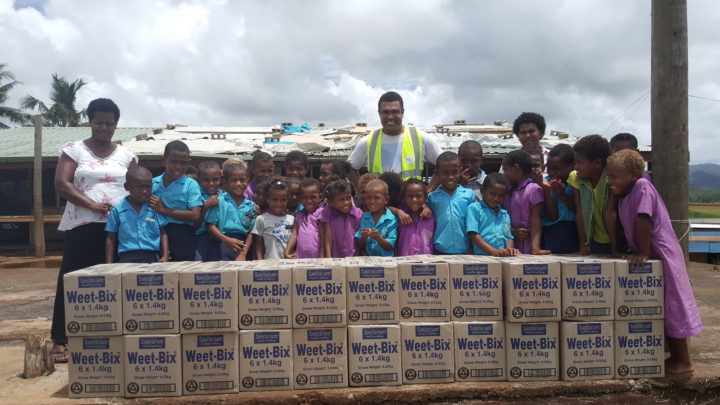Coinciding with the first anniversary of Severe Tropical Cyclone Winston, the Adventist Development and Relief Agency (ADRA) has delivered a two-month supply of Weet-Bix to 14,301 school children in 78 schools in Ra Province, Fiji.
Sanitarium donated 63 pallets (19,080 x 1.4kg boxes) of Weet-Bix to support cyclone-affected communities in the western region where the slow recovery process has been further hampered by recent flooding. The Fiji Government Ministry of Education helped facilitate the distribution of Weet-Bix by providing a list of primary schools still affected by Winston; prioritising schools recently affected by floods in February 2017, and those still attending classes in tents.

Last year, on February 20, Cyclone Winston cut a path of destruction across Fiji. The storm severely damaged schools across the country, with estimated damages to the education sector of FJD$77 million ($A49 million). Ra Province was the worst affected, where more than 80 per cent of schools were severely damaged.
The majority of schools were quickly reopened, while some schools have taken more than a year to rebuild and were not reopened until the 2017 school year. There are still a number of schools that have not been rebuilt, and classes are convened in tents.

Following the cyclone, ADRA Fiji responded by supplying shelter kits, food vouchers and cash in partnership with the United Nations World Food Programme. Weet-Bix was also donated by Sanitarium New Zealand and distributed through the school feeding program to affected schools and communities.
Not only were the schools severely damaged but many of the communities were largely destroyed: houses, water supplies and crops. To date, many of the communities are still in recovery.
“Despite the heavy toll on the communities, parents continue to send their children to school where the breakfast program is the most nutritious meal many of these children have access to on a daily basis,” said ADRA South Pacific director Greg Young. “ADRA and Sanitarium enjoy a long partnership, and we value their contribution to the South Pacific community, particularly in times of disaster.”

In March 2015, the Fiji Government launched a school-based feeding program for primary-aged children. This successful initiative, championed by the Prime Minister, is tackling the nation’s childhood obesity problem by encouraging young people to make healthy food choices. The Government supplies breakfast to all primary schools in the country, with teachers ensuring all children start the day with a healthy breakfast. Both parents and teachers expressed gratitude for the supply of guaranteed breakfast cereal, which also boosts attendance and participation in the classroom.






